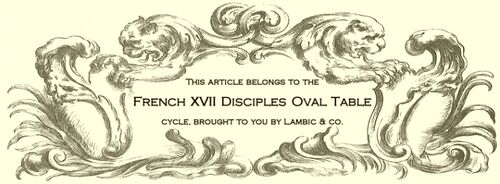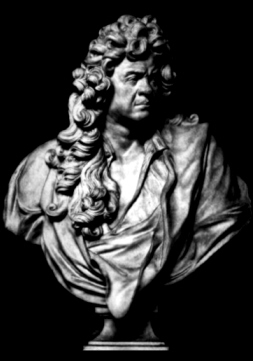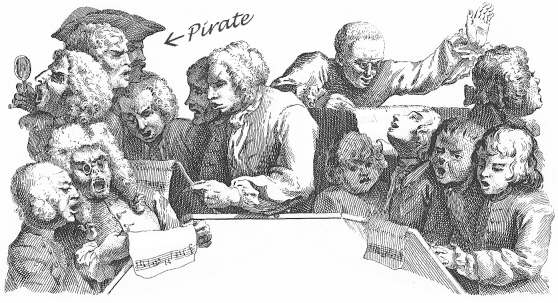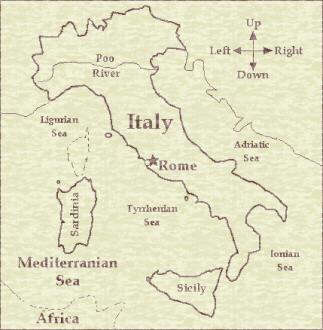Jean-Baptiste Lully
“Rock-a-bye, baby / In the treetop / When the wind blows / Your noodle will rock / When the bough breaks / Your noodle will fall / And down will come baby / Noodle and all”
“I am the master of the accidental!/Je suis le maître de l'accidental!”
“Legrand est arrivé-é-é, / Sans s'presse-e-er: / Le grand Legrand, / Le beau Legrand, / Avec son ch'val et tout transpirant!”
Jean-Baptiste Lully (Italian: Giovanni Battista Lulli; 28 November 1632 – 22 March 1687) was the other half of the Molière/Lully songwriter's duo. Their specialty was the "lullaby", and you don't need to be very smart to see where the name of the genre came from. Before their hit at that kind of song, it was simply called "berceuse". Nowadays, only snobs call it that.
Noodly origins[edit]
Lully was an Italian, who presumeably made spaghetti popular in Paris, through his restaurant "Tempo Di Sturbe Di Nabers", more commonly known as the "Tempo". The waiters in this eating place had a good reputation: they worked very fast. Too fast, sometimes, throwing saucers of spaghetti (not yet served in bowls then), at the clients' tables, in order to gain time during peak hours. This was probably the place where Louis "Rabane" Quatorze saw the "Flying Spaghetti Monster" he claimed to believe in. Too much red wine, probably.
Works[edit]
The restaurant and the lullabies providing his main income, he tried his hand at other genres too, like the opera and the samba. His offer to write a national anthem having been turned down by Louis "Sunny" XIV (not to be confounded with Louis "Rabane" Quatorze, he used the melody for "Jean Bart's Body" instead, with lyrics by, of course, who else, Molière. His "Lullaby of Birdland" went unnoticed, until Ella Fitzgerald made it a popular hit in the second half of the XXth Century.
Duties[edit]
Lully directed the Royal Choir, known as "The Sunny Kings' Singers", and tried to get some music out of the Royal Orchestra as well. Neither of them were very disciplined, and tended to produce accidental counterpoints, which the audience thought of as "modern". Almost none of the musicians wanted to wear Louis Quatorze's sunglasses, but some really "modern" musicians liked the groovy look of them.
Vacations[edit]
Lully liked to take a yearly leave from his duties, in order to go back to Italy and to greet his family. He used to say to Molière, just before leaving, that he was going to visit a "real boot". Needless to say that Molière got fed up with that yearly "funny" comparison between his stage name (a "molière" is a French type of shoe or boot) and the shape Italy had on a map. Actually, it still has (check it out!): modern map-drawing artists don't have the imagination their Medieval and Ancient predecessors had. Getting on with it: one day, fed up with Lully's running joke, he made his own version of Italy's map, and handed it over to the composer on his return from his native country. Take a good look at the recently found document, because it has two particularities:
- it has English captions, which means that Molière knew somebody who mastered this language;
- it has a joke on it. A joke that really pissed of Lully! No, it isn't the compass-card...
Hobbies[edit]
He had none: he claimed that his work was his passtime. Lucky fellow! However, his membership of the XVII Disciples, and more especially the yearly Convention (3th Friday - 4th Friday of January) could be considered passtime, since that had nothing to do with his work. Well, he DID write some occasional ditties (together with his lyricist pal Molière), like "Legrand est arrivé" and "For he's he jolly Disciple", but those didn't take much of his time... When he wrote the music of "Legrand est arrivé", it said "Le Czar est arrivé". Molière nor Lully lived long enough to see the arrival of the Russian monarch happen, and eventually the surviving Disciples adapted the lyrics.
Death[edit]
Lully died when he was keeping time to his orchestra by tapping a baton on the ground. He got so into it that he accidentally punched a hole clean through his foot. He was hospitalized and diagnosed with gangrene, though Lully claimed that "Ai am fahn, eet ees zhust un fleche wounde...leave me zee fahk alone..." Three days later, he died when his head exploded.




